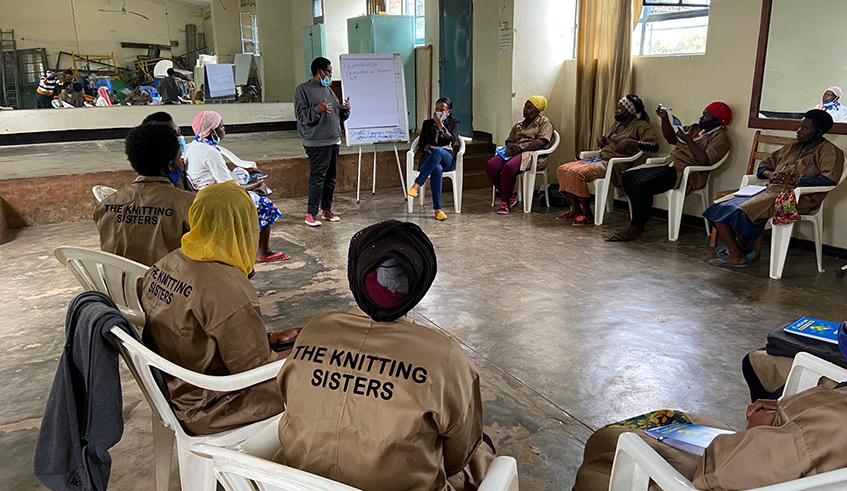Africa-Press – Rwanda. The current reality of teenage mothers is heart-breaking. Society often discriminates against them; they are judged, labelled, and lack access to reproductive health, rights and education—which often results in increased risk of sexual violence and exploitation.
When a young mother is abandoned, neglected or rejected, not only does this have a direct negative implication on her life and that of her child/children, but the ripple effect of those conditions can also be felt in the future of a country’s development.
Take Salama Mushimiyimana, for example. At the age of 15, she gave birth to her son and that was the beginning of a very complicated life. Not only did she have to drop out of out of school, she had to endure scorn from her family and community.
The initiative, founded by Christelle Umuhoza , strives to empower teen mothers to prepare for the future and that of their children. They earn a living through knitting and crotcheting. Photos/Courtesy
“It wasn’t easy, I had to adapt to being a mother at such a young age. With no job, I found it hard to take care of myself and the baby,” she narrates.
As an orphan, she was staying with relatives but their relationship was strained by her pregnancy as they blamed her for being irresponsible. “The situation at home was hard, I lost confidence and lived in complete fear of what my future held,” she says.
Her story is similar to that of Estelle Mushimiyimana; at the age of 19, she had her first born and went on to have another child four years later. This wasn’t her plan, but a lack of sexual reproductive education, among other underlying circumstances, pushed her into this situation, she says.
Like Salama, Estelle has had to endure judgement and discrimination from her counterparts, society and even family members. “It has been hard for me to accept my situation; this is mostly because of lack of financial means to support my kids, but also, because it’s truly hard dealing with how people judge you when you have children out of wedlock,” Estelle says.
Estelle and Salama are some of the many young girls who go on living life in bits and shackles after this challenge befalls them. Many of whom lose themselves, and without help, they can completely lose their sense of direction in life.
However, when empowered and given the tools/resources (i.e. vocational training, business skills, sexual reproductive education etc.), teen mothers become better equipped to raise their children, thereby breaking the cycle of intergenerational poverty found within this group.
Christelle Umuhoza made this observation and started an initiative—The knitting Sisters Project—that would support these young mothers by making sure that they are socially valued and have equal rights.
She offers them a safe space where they can express themselves; receive mentorship, advice and guidance. In addition to wellness and mental health support, they access vocational training in crocheting, knitting and how to use automated knitting machines.
Asked why she chose to stand for their rights and well-being, Umuhoza says it’s her passion for women empowerment, and advocating for different marginalised groups of women and girls that pushed her.
“Through this project, I hope to break the stigma associated with teen mothering, address its potentially detrimental effects, the reasons for its persistence and the effort to reduce it,” she says.
A large majority of the teenage mothers they work with through this initiative have had to drop out of school due to early pregnancy or poverty. Umuhoza says having babies at such a young age has left them vulnerable and helpless, leading to a decrease in their confidence and self-esteem.
“Most of these teen mothers also depend on relatives for survival. This often comes with mistreatment and abuse which tremendously affects their mental health and well-being,” she observes.
The project is helping to shape these young women into strong and confident individuals. Everything done through this mentorship programme and vocational training is to help them restore their self-esteem, become self-reliant and financially independent.
Impact
So far, the young mothers trained through this programme have mastered the basic techniques of crocheting and using automated knitting machines. They are able to make things such as, scarves, gloves, hats, sweaters, and baby shawls.
Umuhoza reveals that upon completion of their training, they go on to form a knitting club where they meet regularly to produce more products for sale, support one another and transfer the knowledge and skills acquired onto other young mothers in their communities.
Salama says the training she got from this project has helped her turn her life and that of her child around. “We were given skills in different areas such as sexual reproductive health and rights, gender equality, managing finances and above all, crocheting which has helped us earn a living,” she says.
Her confidence too has had a boost because she now believes she has hope for a bright future regardless of what she went through. Estelle commends this project for boosting her income, and for that case, she is grateful too now that she can take good care of her two children.
“At first, I could take on any job no matter how small it was. In most cases I would earn very little money, yet it required me to leave my children behind. With this project however, one is assured of a fairly stable income. We can afford certain things we couldn’t before and for that, we are so grateful.”
Changed perception
The current perception in society perpetuates the stigma, health and social disparities associated with teen mothering. This is also deeply embedded in our cultural values which suggest that pregnancy out of wedlock is ‘morally wrong,’ Umuhoza observes.
“Sadly, even in circumstances of sexual abuse, like when a young girl becomes unexpectedly pregnant, she is scorned, shunned, and even blamed, although early pregnancies of adolescent girls are usually a result of lack of support, access to appropriate healthcare services and education,” she adds.
The gender activist discerns that there are good practices and policies tackling early pregnancies, but not enough effort tackling stereotypes that perpetuate the stigma and discrimination against teenage mothers.
The negative perception that mainly stems from ignorance and misinformation further contributes towards the challenges that teen mothers face while transitioning to parenthood. Not only is it harmful to their mental health, it also has negative consequences on their children in the long run.
Young mothers should, hence, be given a platform so they can tell their stories in order to change these stereotypes, Umuhoza says, and that there should also be increased education effort through workshops and awareness campaigns to remove the taboo and shame associated with teenage motherhood.
“The discrimination, social isolation and status loss caused by the current negative perception in our society deter young mothers from continuing their education, pursuing vocational training and accessing health services,” she says.
Umuhoza notes that it’s important to change this perception so that more support and effort is put in place in helping teenage mothers become better prepared for their own future and that of their children.






